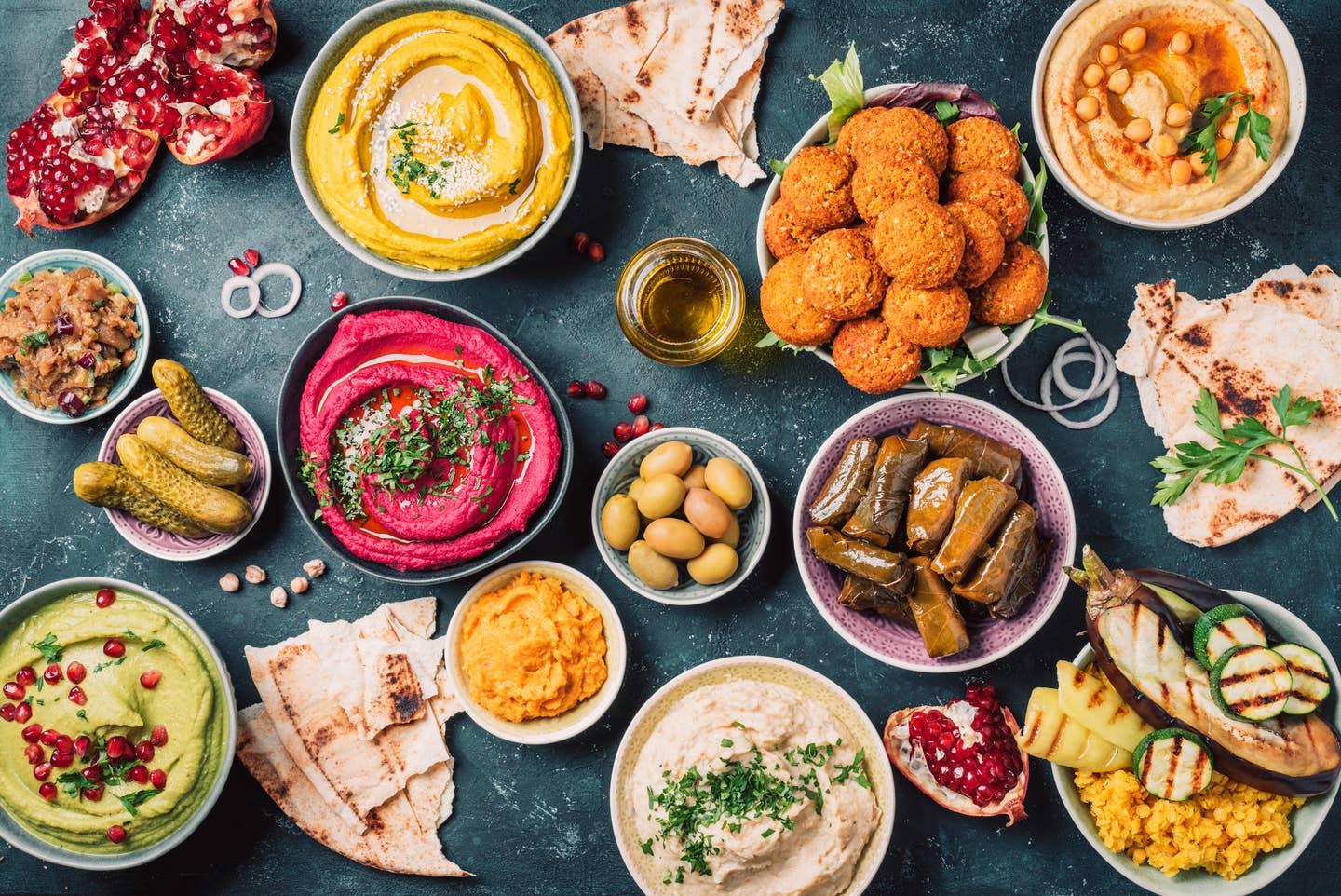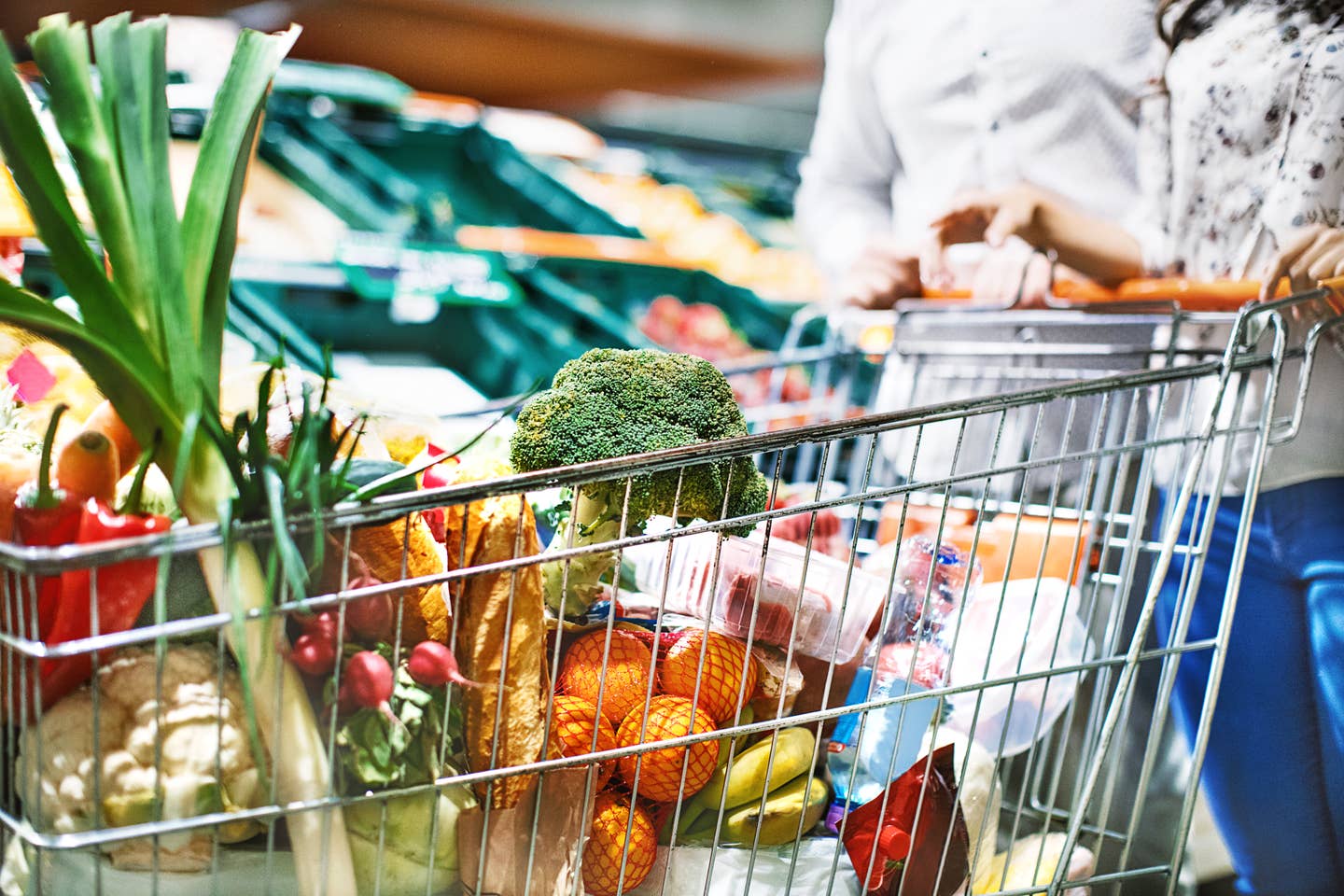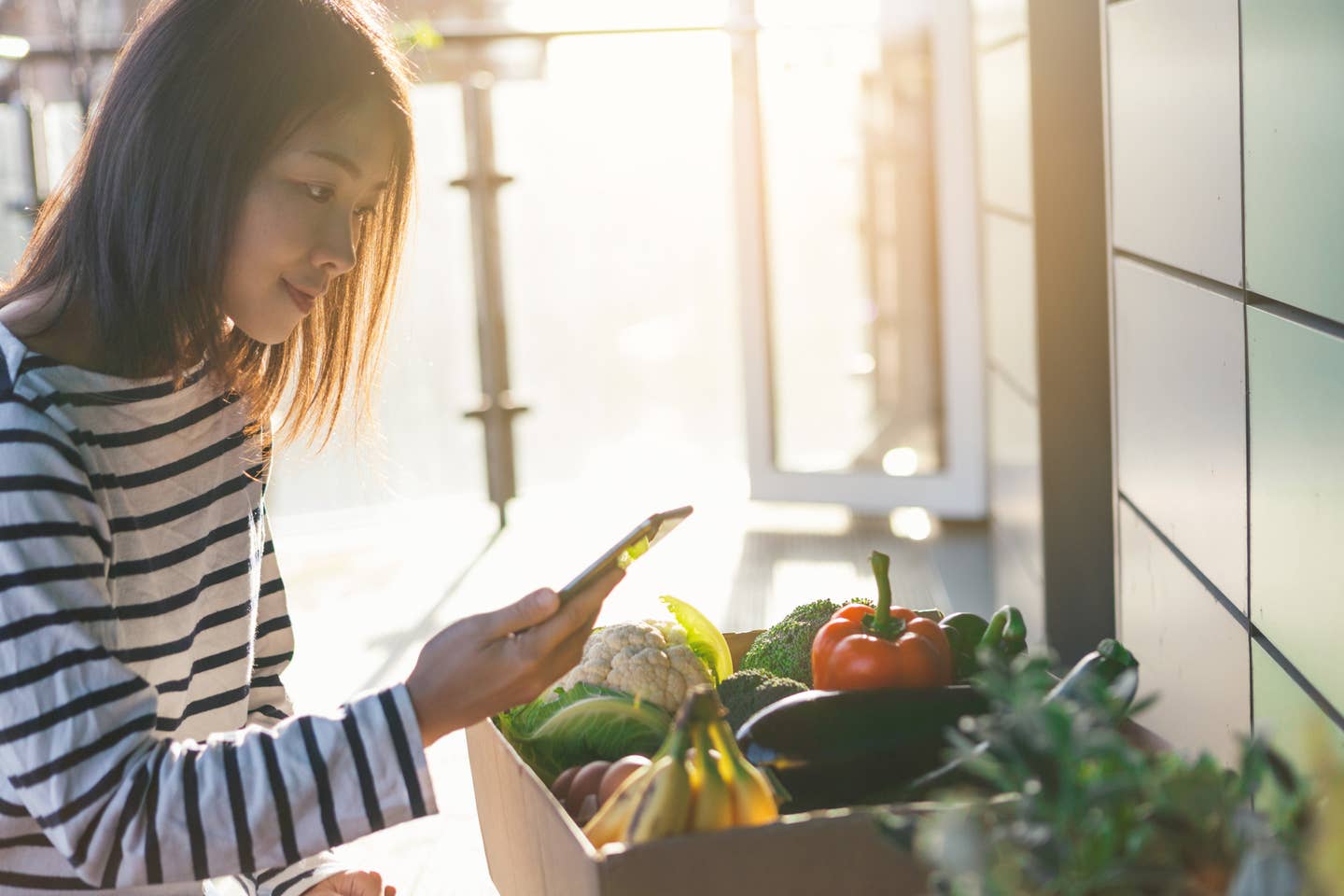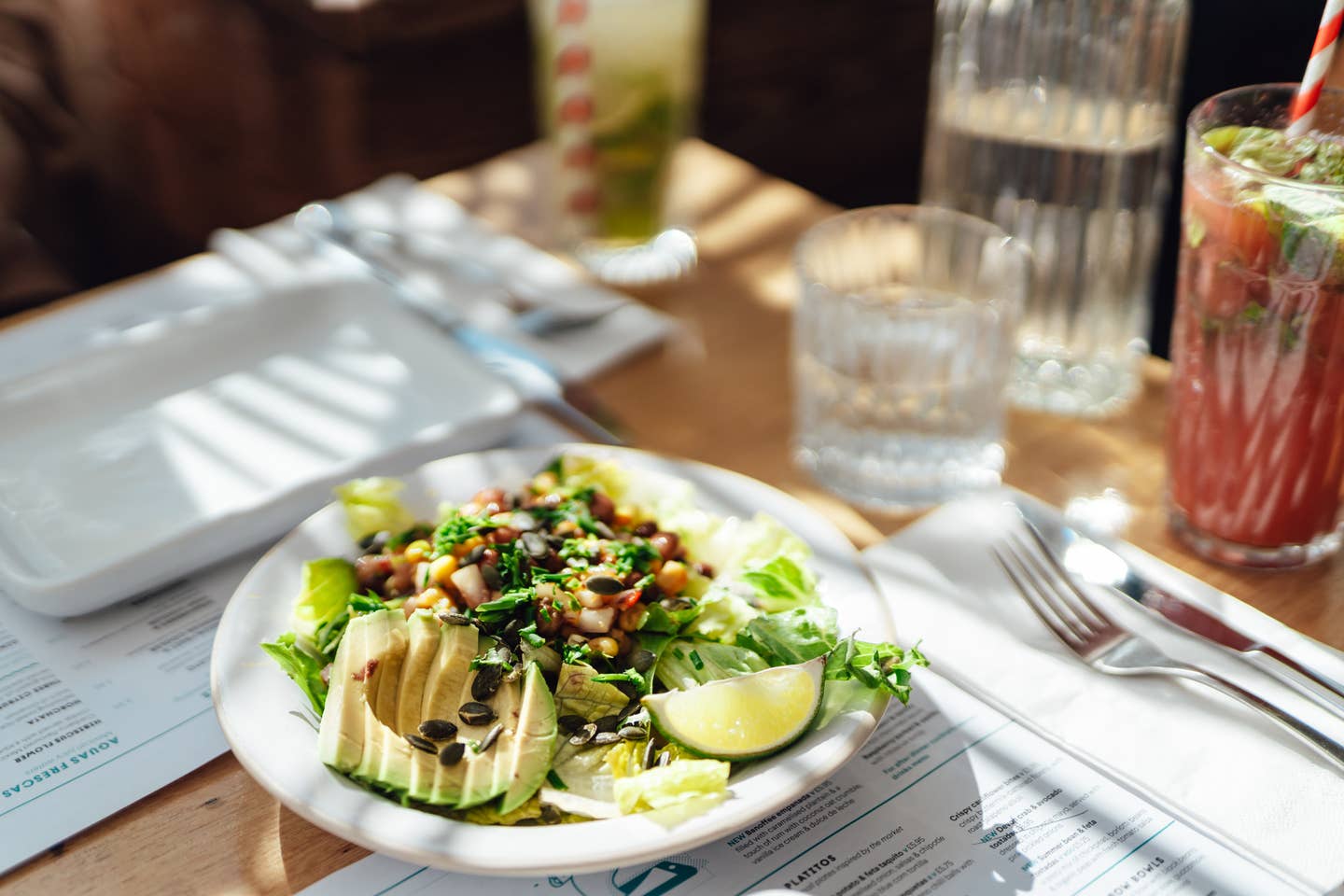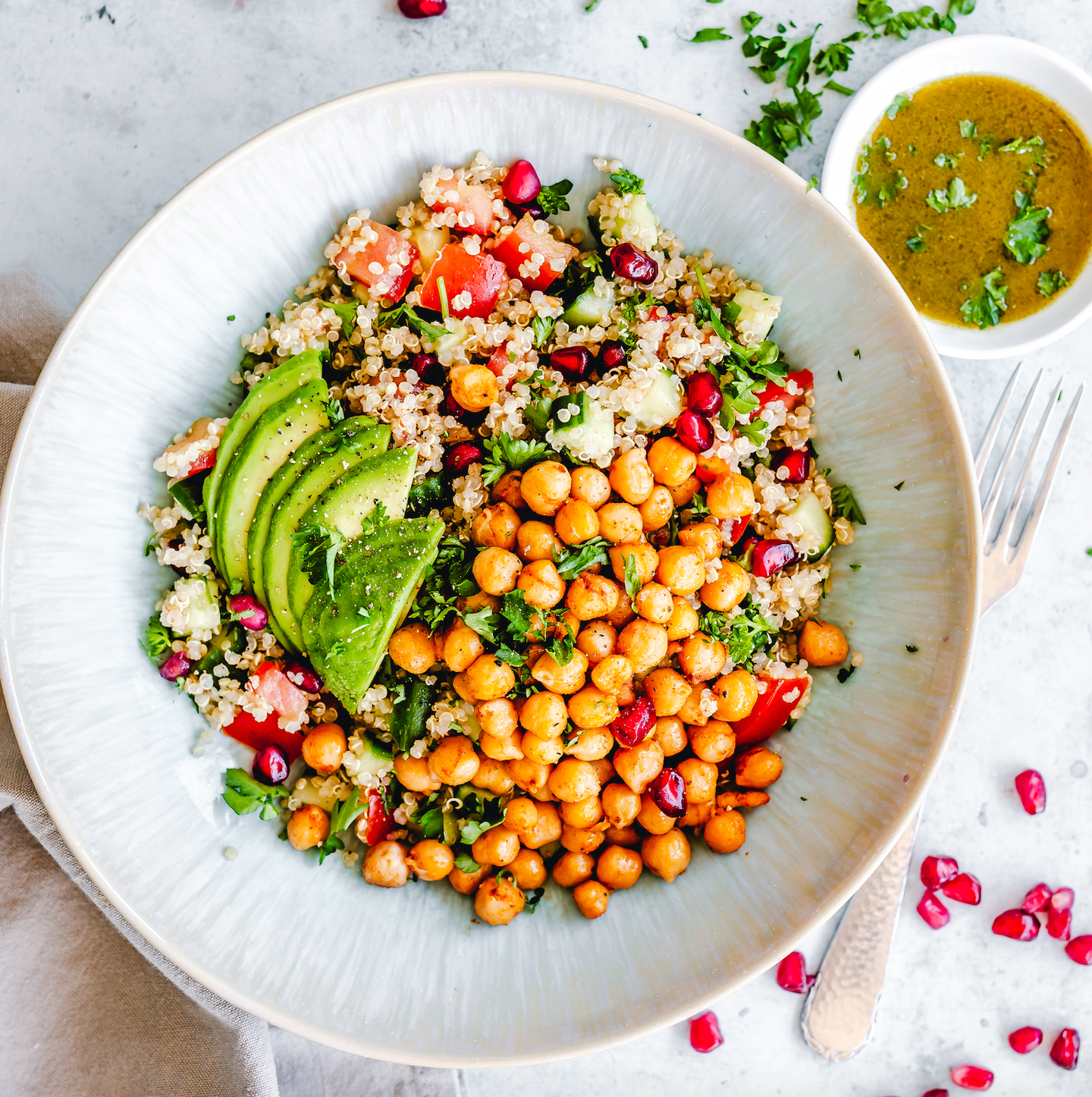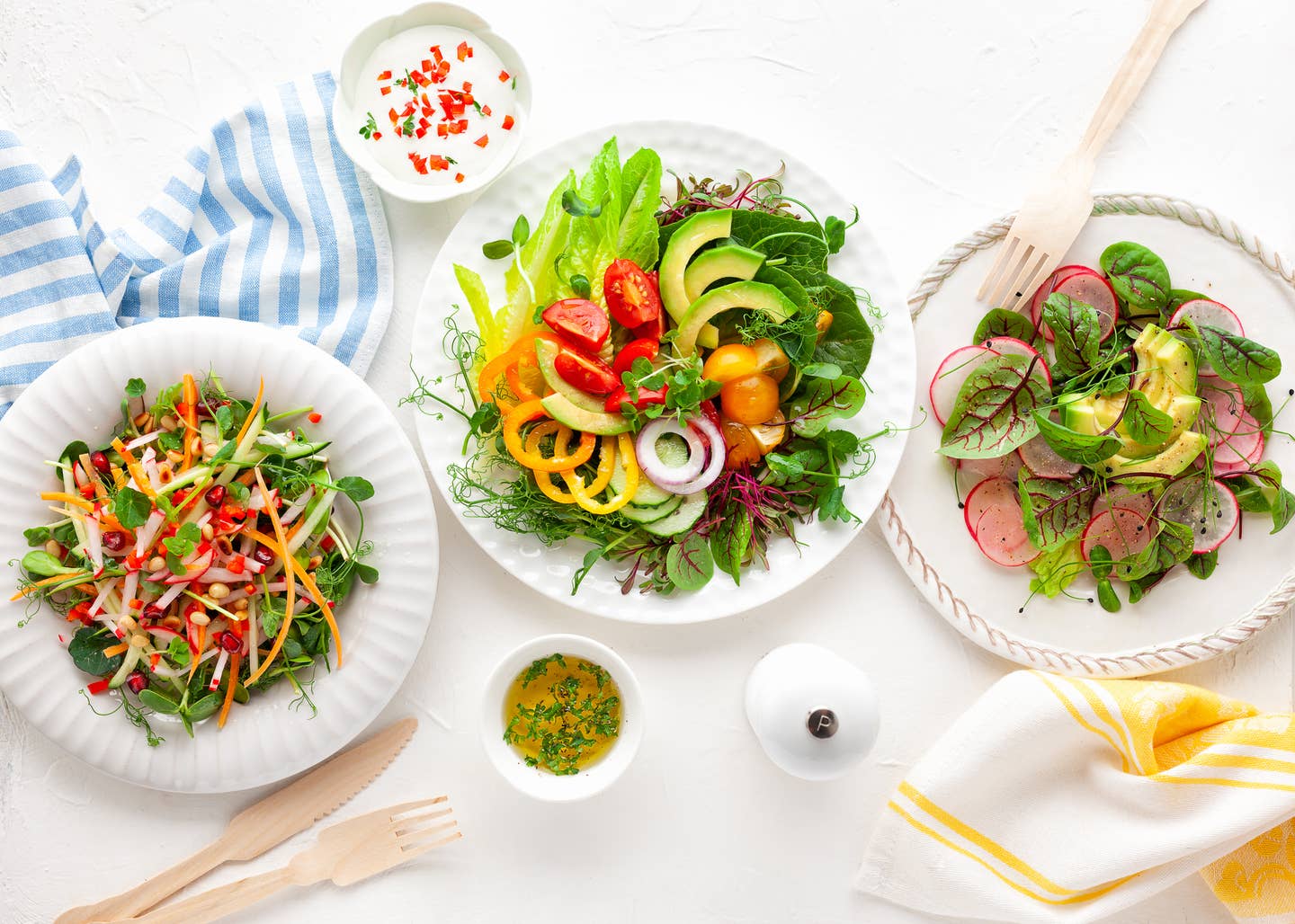
Your Beginner’s Guide to Going Plant-Based: Easy Recipes, Expert Tips & More
Do you want to try eating plant-based but are unsure of where to start? Chances are you have questions! Where do I get my protein? What on earth is there to eat? Is it better to start slow and gradually go meatless, or just leap right in?
No matter the approach you choose, or the reason –– for your health, for the planet, or for animals –– the eventual goal is to take all the meat and dairy of your kitchen and focus instead on filling your plate with as many vegetables, legumes, fruit, nuts, seeds, and whole grains as possible.
How Do I Start a Plant-Based Diet?
Here are the most common questions you may have ahead of your switch to a more plant-based diet. From plant-based protein sources to vitamin supplements, we asked experts to break down the most frequently asked questions.
The Top Questions Surrounding Eating a Plant-Based Diet
1. Who Should Go Plant-Based?
Anyone who wants to be healthier or save the planet. You don't need to have a doctor's note that tells you to clean up your diet. Assume that the best practice, health-wise, is to prevent all major diseases as much as possible, by choosing a healthier lifestyle. That means eating more plant-based foods, fewer animal products, and staying away from junk food or highly processed (bagged, boxed) snacks.
When you think about the climate disasters that have befallen the globe this past summer, from floods in Europe to droughts and fires in the western United States, it's clear that climate change is upon us, and no longer a "future" problem. Animal agriculture accounts for one of the biggest contributors to man-made greenhouse gases, while plant crops such as sorghum and others grab CO2 out of the atmosphere and return it safely to the soil, to enrich our food.
If you want to eat for the planet, and for your health, then go mostly or fully plant-based.
2. What is the Difference Between Plant-Based and Vegan?
You've likely been hearing the term plant-based crop up in conversation or on grocery store shelves and restaurant menus everywhere, but what does it mean exactly? There is widespread confusion surrounding the terms plant-based and vegan because, while similar in meaning, they are not exact synonyms, yet are often used interchangeably.
Vegan refers to a diet without any animal products, and plant-based refers to a diet that is largely comprised of plants. So, while a vegan diet may be plant-based, plant-based diets are not always vegan. Knowing the difference between vegan, vegetarian, flexitarian (where you eat mostly plant-based but still allow yourself small amounts of meat, dairy, and fish in a flexible diet), can help you decide the dietary approach that's right for you.
3. When is the Best Time to Eat Plant-Based?
Start now, even if it's just by adding juicing one meal a day. People sometimes wait to start any diet, until after a wedding, a vacation, or an illness. If you do it now, you'll benefit from the seasonal vegetables that are plentiful this time of year. Start and if you need to take a break or have a meal that is not fully plant-based don't worry. Every incremental step in the plant-based direction makes you healthier.
In fact, just three days of adding juicing to your diet are enough to tip your microbiome to be healthier, one study found, and the benefits lasted 14 days later. And another recent research finding shows that just 5 plant-based meat alternatives a week (instead of real meat) is enough to change your microbiome and make it healthier.
The point is the more plants and less meat you eat, the healthier you'll be, starting now. So rather than wait, just start and do the best you can. You're moving in the right direction!
The amazing thing is how quickly your body will react and begin to feel better. In just a matter of days, your body gets healthier on a plant-based diet.
4. Why Should I Go Plant-Based?
Here at The Beet, we want to encourage as many people as possible to adopt a more plant-based diet, but don't just take our word for it: There are well dozens of recent studies that show how a plant-based diet can benefit your heart health, lower your lifetime risk of cancer, help you avoid diabetes and keep you from ever hearing that you are a candidate for having a heart attack, or suffering a stroke or any of the other related symptoms of heart disease.
The main reason that going plant-based is that you are getting your protein and nutrients from clean sources –– plant foods that grow in the ground, on bushes and trees, and the leaves themselves –– as opposed to from meat which comes bundled with artery-clogging saturated fat that can cause high cholesterol, high blood pressure and even heart failure.
Not to state the obvious, but plants have fiber (it's what keeps them reaching for the sky) and all that fiber acts as probiotics and prebiotics in your gut, switching it over from unhealthy bacteria balance to healthy bacteria, which is the genesis of what drives our body's health processes. Your gut health essentially rules the immune system, circulation health, and all the other cellular processes in the body.
Going plant-based (adding more whole foods and cutting out animal products and highly processed foods with added sugar that have had all the nutrients stripped out of them) has so many incredible health benefits associated with it that you will help your body fight every major lifestyle disease.
Every week, there are new studies that show that eating plant-based is healthier, as research proves, again and again, that plant-based foods are healthier for you – from your gut to your heart, as well as for your brain and your immune system – and see how you feel when you start eating this way. It only takes a few weeks to start seeing results like clearer skin, lower cholesterol, and reduced blood pressure.
If you want to check with your doctor and get a baseline blood test and blood pressure reading before you start your new plant-based diet, you may enjoy knowing that what the research says is true: Your major health markers will improve, along with your diet.
5. What are Plant-Based Protein Sources?
Everyone asks this. From plants! Where do great apes or racehorses get their protein? And these are all bigger, stronger, faster animals than you are. It turns out that protein in plants gets passed through the animal that eats it to us, but with a whole lot of unhealthy stuff in the mix, especially saturated fat.
If we just cut out the middle man (or beast) we can get all the protein you need that's clean, packed with vitamins and nutrients, and are full of gut-healthy fiber. Plant-based foods like tofu and seitan have plenty of protein, but so do whole foods. Don't believe us, check out the top 10 sources of plant-based protein, according to a nutritionist.
If you don't want to eat tofu or seitan (both amazing sources of protein), then pile on the veggies, snack on nuts, choose whole grains like brown rice, and make a habit of sprinkling seeds on your salads and smoothies. Vegetables, legumes, and whole grains like quinoa, plus nuts and seeds all are great sources of protein on a plant-based diet.
Everyone is obsessed with protein, but fiber is actually your diet's unsung hero. It keeps us feeling food, and slows down the food that gets absorbed into the body, which makes your body believe that fuel and essential nutrients are still on hand, so no need to eat again, Plants have fiber, and animal products don't. Add as much fiber to your diet as you can to be your healthiest.
To get more fiber in your diet, focus on eating more plants, especially the 20 best sources of fiber.
6. How to go plant-based? Here's how to start, according to an RD
As we said, there is no single best way to go plant-based and it depends on your personality. If you ever smoked, did you kick it cold turkey, use the patch, or just cut down? The same question applies here. The best way to go plant-based? The way you'll do it and stick to it.
To steer you towards the best way to begin eating a more plant-based diet, a Registered Dietician breaks down their tips to ensure you're taking the right path for your health when you start on your plant-based journey.
One tip: start with breakfast. Oatmeal and berries, avocado toast, almond butter, and bananas all are amazingly filling, protein-packed healthy plant-based meals to start the day. Try new things and stick with them even if you falter. This isn't an all-or-nothing binary equation. The more plants you eat the better, so keep going.
Worried about whether you're going to be eating a balanced diet? You do need to pay attention to getting all the nutrients you need. Here's how to have a balanced diet when going plant-based, from an RD. One way to have a balanced diet is to plan your protein sources and make sure that you eat enough heart-healthy fat since both keep you feeling full for longer than carbs and you won't go reaching for junk food as readily.
Keep your pantry stocked with whole grains like oatmeal and brown rice or pasta, and make a huge batch of vegetable and tomato sauce and freeze it in smaller portions so no matter how hungry you are when you get home from work you can whip up a healthy meal in the time it takes to defrost. Meal prepping on Sundays is a great way to keep healthy food in the house.
7. Do You Need Supplements On a Plant-Based Diet?
You don't technically need a supplement because you are eating plant-based. You likely would need to take B12 or vitamin D whether you ate a carnivorous diet or not, since both these are hard to come by naturally in the food you eat. There is a reason that milk (and some plant-based milk) is fortified: Americans don't get enough vitamin D in their daily diets to reach what is considered a healthy amount.
We also need to prioritize Omega-3, a heart-healthy fatty acid that is found in algae, and that when fish eat, they pass it to us if we eat the fish. In any case, there are a few different vitamins and minerals that are tough to get, no matter how many veggie-packed grain bowls you down in a day. For that reason, there are seven supplements to consider taking on a plant-based diet. But before you take anything, other than whole foods, check in with your MD since she or he may want to do a quick blood test and see if you are in the normal range.
8. Is Eating Plant-Based Expensive?
Everyone jokes that Whole Foods should be called Whole Paycheck. Okay, so that one store does seem to set us back more than we expect every time we visit, but it may be because instead of buying just one plant-based ice cream we feel the need to sample six or seven.
But is a plant-based diet expensive? Actually, the opposite is true: It's less expensive to eat vegan or plant-based, especially if you are leaving meat and dairy out of the basket. Studies show that eating plant-based can actually cut your grocery bill significantly, flying in the face of the myth that eating healthy also means paying more.
One survey of shoppers found that going plant-based lowered their grocery bills by $23 a week, and other studies have found similar results. Rice and beans aren't expensive, which is why half the world lives on these staples, no matter what their economic situation.
If you want to save money at the market, there are tips for buying in bulk on sale and saving a bundle.
9. Where Can I Learn More About Eating Plant-Based?
Now that you're almost ready to get started, check out these documentaries to learn even more about how a plant-forward diet can benefit your health, and follow these plant-based influencers to inspire you along your journey.
You'll find that influencers, athletes, actresses, singers, musicians, and others all want to share their tips for success on a plant-based diet. For inspiration and helpful tips to help you stick with it, check out these great sources:
- What to watch, including documentaries like What the Health
- Who to follow, on IG for major inspiration
- Plant-based athletes who are actually game-changers
- Celebrities who ditched meat, from actresses to musical artists
- The 5 best tips to stick with it from the editors and others
10. What Do I Eat On a Plant-Based Diet?
These breakfasts, lunches, dinners, snacks, and desserts are all the recipes to last all week and get started on your plant-based journey.
Want to get The Beet's Ultimate Beginner's Guide to Going Plant-Based emailed to you every day to make it even easier? Sign up here.
Sign-Up for the Beginner's Guide to Plant-Based Eating
More From The Beet

